





Page 3
Introduction
-The English Baccalaureate
- Important dates in the Options process
The Compulsory Element
Page 4
Page 5-6
Page 7
Page 8
Page 9
Page 10
Page 11-12
-English Language
-English Literature
- Mathematics
-Combined Science
Personal Development / Careers
Core Physical Education
The Options
- Advice on selecting your options
- Who can support you with your choices?
- Important information to note -KS4 Time Management
Closed Choices
Page 13-14
Page 15
Page 16
Page 17-18
Page 19
Page 20
Page 21-22
Page 23-24
Page 25-26
Page 27
Page 28-29
Page 30-31
Page 32
Page 33
Page 34
- Geography
- History -Spanish
Open Choices
-Art & Design
-Computer Science
- Creative I Media
- Design & Technology
-Design
- Food Preparation & Nutrition
- Hospitality & Catering
-Music
- Photography
-Religious Studies
-Sports Studies
Useful Careers Guidance and Future Pathways websites

Year 9
‘Expression of
4 Feb - 11 Feb 2025
Options Evening 27 Feb 2025
Year 9
Options Choices Deadline
6 March 2025
Year 9
1-1 Review Interviews
March/April 2025
Options choices published to parents and students
May 2025
Key Stage 4 is the name given to the two years (Years 10 and 11) during which the majority of courses studied lead to external qualifications such as GCSEs. There are some elements of Key Stage 4 which are compulsory and some elements which are optional.
This diagram shows you how the numerical ‘New grades’ for GCSE compare with the more familiar lettered ‘Old grades’ for GCSE:
The English Baccalaureate, ‘EBacc’, is not a qualification in itself; it’s the name given to a collection of subjects which include English, Mathematics, two Sciences, a Modern Foreign Language and either History or Geography. To achieve the EBacc students must have secured a grade 5 in each of their subjects within this collection.
All students who want to make their application to higher education stand out are advised to choose subjects which would lead to the EBacc as this may give them an advantage when their application is considered.

“Language is the foundation of civilization. It is the glue that holds people together, and it is the tool of progress.” –Barbara W. Tuchman
Exam Board: AQA
The GCSE English Language course provides more than just the foundation for further study in English; it enriches students’ understanding of the world around them. By encouraging critical thinking, cultural awareness, and creative expression, the subject prepares students for a wide range of careers while nurturing their ability to communicate confidently in an ever-changing global society.
All students will study both English Language and English Literature leading to two separate GCSE qualifications.
Key components:
- Reading Skills: Students analyse a wide range of texts, including fiction and non-fiction, developing the ability to identify key themes, meanings, and language techniques.
- Writing Skills: Students develop their ability to write effectively for different purposes and audiences, focusing on narrative, descriptive, and persuasive writing.
- Spoken Language: This aspect focuses on students' ability to communicate effectively in spoken contexts, allowing them to develop confidence in discussions, presentations, and debates.
Explorations in creative reading and writing
Section A (25%)
Section B (25%)
Writers’ viewpoint and perspective
Spoken Language (Non-linear assessment)
English Language skills are essential for a wide range of careers, as effective communication is key in nearly every industry.
Advertising & Copywriting
Careers in advertising, branding, and copywriting depend on the ability to use language effectively and creatively.
Section A (25%)
Section B (25%)
Students will answer reading comprehension questions on a fictional prose extract from the 20th or 21st Century; Descriptive and narrative writing – Students will write a description based on a picture stimulus or a story based on a title.
Students will answer reading comprehension questions on two non-fiction texts. They will be drawn from the 19th century, and either the 20th or 21st century depending on the time period assessed in Paper 1 in each particular series. Students will complete a piece of transactional/ persuasive writing (for example: a letter, speech or article). It will specify audience, purpose and form, and will use a range of opinions, statements and writing scenarios to provoke a response.
Students will present a speech to the class on a relevant topic of interest and will respond to questions relating to this.
Journalism & Media The ability to write clearly, concisely, and persuasively is fundamental for writing articles, reports, and producing content for various platforms.
Law
Strong written and verbal communication skills are necessary for drafting documents, arguing cases, and interpreting legal texts.
Creative
Writing & Publishing
These fields require an in-depth understanding of language and its nuances to ensure clear communication across cultures.
Public Relations & Marketing
A strong command of English Language is vital for creating compelling press releases, advertising materials, and promotional content.
Education
Many careers in teaching, from primary schools to higher education, require a deep understanding of language.
Translation & Interpretation
These fields require an in-depth understanding of language and its nuances to ensure clear communication across cultures.

“The greatest proof of the value of literature is that it allows us to see the world through the eyes of others.”
- T.S. Eliot
Exam Board: EDUQAS
The GCSE English Literature course encourages students to dive deeply into the world of storytelling, culture, and human experience. By studying a wide range of texts, students gain critical thinking, writing, and analytical skills, while also developing a profound understanding of history, society, and identity. Whether pursuing further study in literature or moving into a variety of career paths, this subject provides the foundation for a range of professional opportunities and enriches students’ lives with a deeper cultural and intellectual appreciation for the power of words.
Key components:
-Literary Analysis
Students study a range of literary texts from different genres and historical periods, focusing on aspects such as character, theme, structure, and language.
-Contextual Understanding
The course requires students to consider the historical, social, and cultural context in which texts were written, helping to build a deeper understanding of the literature.
- Essay Writing
Students develop their essay-writing skills, learning how to organize and express their ideas clearly and coherently with a focus on textual evidence. :
In the GCSE English Literature course, memorizing key quotes from the texts you study is vital for a number of reasons:
Supporting Analytical Points
Demostrating Close Reading Skills
Enhancing Understanding of Characters & Themes
Strengthening Essays and Exam Responses
Component 1
Shakespere and Poetry
Component 2
Post-1914
Prose/Drama, 19th Century Prose and Unseen Poetry
Section A (20%)
Section B (20%)
Knowing a selection of key quotes by heart boosts your confidence when responding to questions in class or exams.
Quotes provide concrete evidence to back up your analysis and interpretations of a text.
Memorizing quotes also improves your overall retention of the text.
By memorizing important quotes, you show that you have engaged in close reading of the text.
Quotes often reveal crucial aspects of characters, such as their motivations, attitudes, or development throughout the text
During exams, you are expected to quickly recall relevant quotes to support your answers. Being able to remember key quotes allows you to write more detailed, focused responses and showcase your knowledge un vder time pressure.
Students will answer questions on an extract from ‘Macbeth’ and one essay question upon the whole play. Students will not have a copy of the play in the exam.
Poetry from 1789 to present day – Students will answer two questions based on the 18 poems studied. Students are not permitted to take their anthology into this examination.
Section A (20%)
Post-1914 prose/drama - Students will answer an essay-style question on an extract from ‘An Inspector Calls’. Students will not have a copy of the text in the exam.

English Literature is valuable for a variety of careers that require strong analytical, writing, and communication skills.
Teaching and Education
Teachers not only guide students in literary analysis but also foster a lifelong appreciation for reading and writing.
Journalism and Media
Whether writing book reviews, reporting on cultural events, or creating in-depth feature articles, English Literature students are equipped with the skills needed to interpret and convey information engagingly.
Librarianship and Archiving
A career in librarianship or archiving requires a deep knowledge of literary works and the organizational skills to manage vast collections of texts. Understanding the significance of literature and history allows professionals in this field to support research and preserve cultural works. From reviewing manuscripts to editing written works for clarity and style, English Literature skills are in high demand in this sector. Legal careers require the ability to construct coherent arguments and interpret texts.
Publishing and Editing
Creative Writing
English Literature fosters creativity and a deeper understanding of narrative techniques, which is essential for aspiring novelists, poets, screenwriters, and other creative writers.
Public Relations
Careers in PR involve constructing narratives, handling media communications, and crafting messages that influence public perception.
Advertising and Marketing
Crafting persuasive messages, understanding audience engagement, and employing creative strategies are all skills fostered through literary study.
Law

“Without mathematics, there’s nothing you can do. Everything around you is mathematics. Everything around you is numbers.”
- Shakuntala Devi
Just as languages provide the building blocks and rules we need to communicate, maths uses its own language, made up of numbers, symbols and formulae; to explore the rules we need to measure or identify essential problems like distance, speed, time, space, change, force and quantities.
The GCSE course is intended to help students become fluent in the fundamentals of Mathematics, ensure that students can reason mathematically and develop competence in solving increasingly sophisticated problems. Students will build on their learning from Key Stage 3.
Assessment objectives ensure that each paper will assess students’ ability to recall, select and apply their knowledge of mathematics, to reason, interpret and communicate mathematically and to solve non-routine problems. The content will cover number, algebra, ratio, proportion and rates of change, geometry and measures, probability and statistics.
The course will be examined in three equally weighted written examination papers in May/June.
Studying maths helps us find patterns and structure in our lives. Practically, maths helps us put a price on things, create graphics, build websites, build skyscrapers and generally understand how things work or predict how they might change over time and under different conditions. Paper 1 (Calculators)
Paper 3 (Calculators)
Each paper has a range of question types; some questions will be set in both mathematical and non-mathematical contexts.
The examination has two tiers which will allow entry for students at a level that best suits their abilities and ensures a Grade 4 and 5 are accessible to all.
Foundation Tier Grades 1 - 5
Higher Tier Grades 4 - 9
The qualification will be graded from 9 to 1 using the total mark across all three papers where 9 is the highest grade. Individual papers are not graded and there is no Controlled Assessment or coursework element.
You’ll need to continue studying GCSE maths, if you’re on a 16 to 19 study programme and do not achieve a minimum of a grade 4 at the end of year 11.
Maths is the best subject to develop your analytical, logic and problem-solving skills. Not only will studying maths help give you the knowledge to tackle scientific, mechanical, coding and abstract problems, but it will also help you develop logic to tackle everyday issues like planning projects and managing budgets.
For those reasons, maths can lead to many different careers including accounting, medicine, engineering, forensic pathology, finance, business, consultancy, teaching, IT, games development, scientific research, programming, the civil service, design, construction and astrophysics to name a few.
Specific job roles include actuary, business analyst, software engineer, technology analyst, information engineer, speech technology researcher, and maths teacher.

"The science of today is the technology of tomorrow."
- Edward Teller
Exam Board: AQA
Students will follow the AQA GCSE Combined Science
Trilogy Course
Science Skills
There are many skills developed through the Science curriculum, those listed below are the foundations for everything else that is to come in terms of future employment attributes:
- Observation
- Classification
-Measurement
- Prediction -Controlling variables
- Interpretation
- Communication
- Drawing conclusions
Biology
Summary of assessment
Cell biology, Organisation, Infection and Response, Bioenergetics, Homeostasis, Inheritance, Ecology.
Atomic Structure, Bonding, Quantitative Chemistry, Chemical changes, Energy changes, Rate and Extent of chemical change, Organic Chemistry, Chemical Analysis, Chemistry of the Atmosphere, Using resources.
Energy, Electricity, Particle Model of Matter, Atomic structure, Forces, Waves, Magnetism and Electro-Magnetism, Space Physics.
Six Written Papers2 x Biology, 2 x Chemistry, 2 x Physics (Each worth 16.7% of the total)
GCSE (Double Graded)Each paper lasts 1 hour 15 minutes, with 70 marks available on each paper.
Biology
Chemistry
Physics
Paper B1
Paper B2
Paper C1
Paper C2
Paper P1
Paper P2
Biology topics 1-4
Biology topics 5-7
Chemisty topics 1-5
Chemistry topics 6-10
Physics topics 1-4
Physics topics 5-7
The examinations have two tiers which allow entry for students at a level that best suits their abilities and ensures a Grade 4 and 5 are accessible to all.
Foundation Tier Grades 1 - 5
Higher Tier Grades 4 - 9
The pupil’s ability to work scientifically is assessed across the whole course through the six exams There are no controlled assessments, the combined exams are worth 100%.
If
Chemical Engineer
Clinical Scientist
Food Technogist/ Scientist
Marine Biologist
Forensic Scientist Geologist Ecologist
Nanotechnologist
Robotics Engineer Architect/ Surveyor

Within Personal Development lessons, a wide range of topics are covered including the PSHE curriculum (Personal, Social Health and Economic education), statutory RSE (Relationships and Sex Education), some elements of the CEIAG (Careers, Education, Information, Advice and Guidance) as well as Citizenship.
These topics are delivered in timetabled lessons once per week and complemented through tutor periods and assemblies.
Personal development is an integral part of our curriculum offer and as well as being taught in these standalone sessions is weaved through all that we do in subject areas.
At Wellfield Academy, we teach Careers’ Education to all year groups within the Personal Development curriculum, and this is supplemented by a comprehensive calendar of events throughout the year. We have strong connections with external agencies, employers, colleges, universities and other course providers, who regularly deliver assemblies on careers and next steps and support us with school careers’ fairs and in-school events.
Students benefit from specialist careers’ guidance from a Career North careers’ adviser, who spends a day in school each week, alongside supporting with some Personal Development lessons and attending Parents’ Evenings. Representatives from local colleges attend Key Stage 4 Parents’ Evenings to assist with advice on next steps. In addition, Year 10 students have the opportunity to visit colleges and to complete work experience.
A Levels
- Subjects based on route of study
- Usually choose 3 subjects
- Will study for 2 years
- Entry requirements will be a minimum of 4 GCSE’s grades 9-4 including English and Maths
- Mainly written, theory work with an exam at the end of the 2nd year
Vocational
- Sometimes referred to BTEC’s and NVQ’s
- More practical and work related, more likely to link to a job or area of employment
- More opportunities in different areas
- Offered in different levels
- Work experience / placement built into the course
A two-year qualification for 16–19-year-olds designed in collaboration with employers. Each T Level is equivalent to 3
A Levels, with the aim to support the young person to develop their skills, knowledge and to thrive in the workplace.
Students choose different T Level specialisms, and develop the key skills required in industry. T Levels offer a mixture of classroom learning and ‘on the job experience’ through an industry placement. Entry requirements for T Level will generally be a minimum of five GCSE’s at grade 4 and above to include Maths and English (and sometimes Science depending on the area of T level). Progression from the T level will be either: employment, a Higher or Degree Apprenticeship or Higher Education.
Apprenticeships allow you the opportunity to work and gain recognised qualifications at the same time (e.g. NVQ’s) and are available in a range of occupational areas. Examples include retail, business administration, catering, childcare, motor vehicle, engineering, construction, accounting, science, customer care and hairdressing.
This qualification will help you develop the skills you need to do your job effectively. Examples of these could include:
- Learning how to wash and cut hair in a hair salon
- Learning how to monitor development and deliver activities to children in a childcare setting
- Learning how to read plans and make technical calculations in a construction trade

Physical Education remains a compulsory subject in Years 10 and 11 and all students have 2 hours of dedicated curriculum time.
The emphasis in KS4, is on participation and enjoyment to promote a prolonged interest in sport and physical activity.
Students are given the opportunity to study a variety of practical activities but must ensure that they focus on skills and attributes outlined below:
- Outwitting opponents
- Accurate replication
- Exploring and communicating ideas, concepts and emotions performing at maximum levels
- Identifying and solving problems
- Exercising safely and effectively to improve health and wellbeing.
Throughout years 10 and 11, students will study several sports in depth. Students will be required to select a pathway depending on what sports they want to focus on.
The pathways are outlined as:
Pathway 1
Competitive Focus
Pathway 2
Engagement Focus
Netball Football Rugby Handball Basketball
Exercise to music
Table Tennis
Badminton Volleyball Rounders
Students are encouraged to undertake different roles such as performer, coach and official. To improve their skills, extra- curricular activities are also available.
This course aims to encourage students to pursue active and healthy lifestyles.
It does not include an external examination; students will be assessed on their ‘Engagement in Learning’ only. There will, however, be a focus on developing high quality skills – something that is imperative to the course.
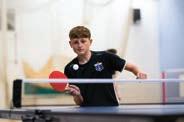
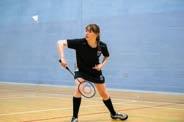

Students are required to choose 3 option subjects.
They will study these subjects for 6 hours a fortnight.
Students must choose at least one from either; History, Geography or Spanish - the EBacc subjects.
Important information to Note
We shall do our best to provide the choices that you have selected but we cannot guarantee that this will be achieved in every case. A course cannot run if insufficient students have opted for it, whilst other courses may be oversubscribed.
Please read the subject information carefully as it describes the content and assessment requirements for each of these courses.
Read all options information carefully, you need to know what you are signing up to study.
Think about which courses could help you in the future, either with career goals or useful skills and knowledge.
Select subjects you feel you are good at and that you enjoy.
Consider how you feel about the skills elements, i.e. are you comfortable performing in front of people, which could be required in Drama.
Consider the examination and coursework content, both will require good time management and an awareness of deadlines.
Who can support you with your choices?
Parents who know you best of all
who know your ability in their subject
Don’t choose an option because your friends are choosing it, there are no guarantees you would be in the same class and you need to consider your future.
Don’t choose an option because of a particular teacher, there is no guarantee that they would teach your class.
Don’t choose an option because you think it would be easy, there are no ‘easy’ GCSE or BTEC courses.
Personal Tutors who sees you everyday and is available to talk about any issues
Progress Leader who wants thebest for you as an individual and may follow up your conversations with your tutor.
Senior Leadership Staff who may follow up with you if there are any issues with yoir options
The ‘two-year’ courses in fact last for about five school terms, because in May and June of Year 11 you will be taking your final examinations. In any case, there are more demands on your time and the way you organise all your time will be very important. You will need to make homework a priority. Organise your homework carefully and balance your homework with your social life and other worthwhile pursuits. Make sure you plan to make the most of your time, and don’t leave everything until the last minute. In Years 10 and 11, homework assignments are sometimes given over a longer period of time and involve different tasks. Organisation, therefore, becomes very important. When you are in school, make the most of all the opportunities there are to learn new knowledge and skills in lessons and other activities.
Some of the decisions which you need to make about your work in Years 10 and 11 are not decisions about which optional courses you should take, but how you are going to work towards success and achievement in all the courses you will be taking. Your preparation for Year 10 has already begun. Remember that good attendance is vital for success. Aim for 100% attendance and do not have any time off school unless there are sound medical reasons for doing so. Even 90% attendance means that you have had one day out of school a fortnight and this lost learning can add up to gaps in knowledge.
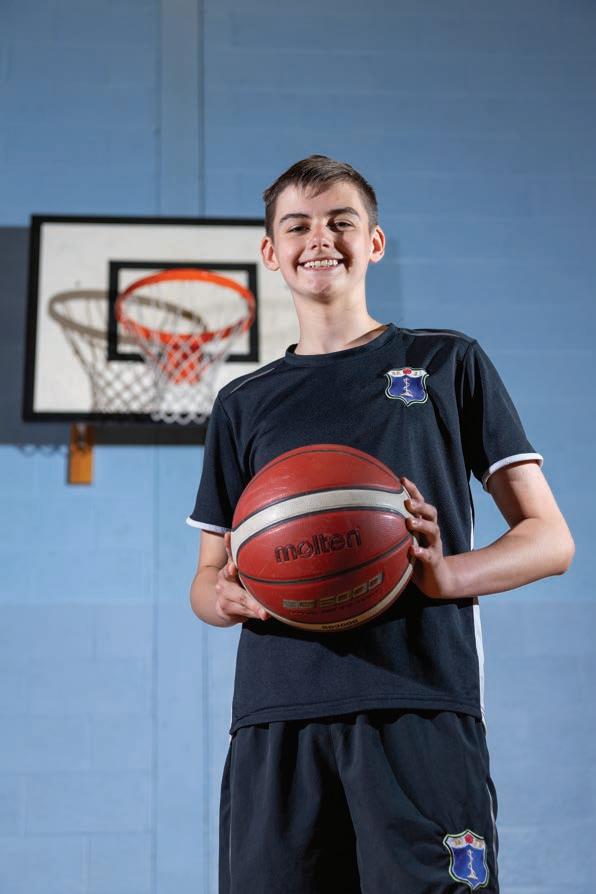

“Geography illuminates the past, explains the present and prepares us for the future. What could be more important than that?”
- Sir Michael Palin
Exam Board: AQA
Why should I study Geography?
In our changing world nothing changes more than geography. It is more than just memorising places on a map. It’s about understanding the complexity of our world and how it works. So many of the world’s geopolitical problems, boil down to Geography; it is one of the most exciting, adventurous and valuable subjects to study today. You will find geographers working in a wide range of jobs including disaster management, tourism and charities. Studying geography can help young people achieve careers that are professionally and financially rewarding, as well as being enjoyable. You will definitely be going places with Geography!
At GCSE you will learn how human and physical processes bring about change, you will study the UK and other places, landscapes, weather and climate, global ecosystems and biodiversity, resources and how we manage them. You will also develop your geographical skills including map reading, Geographical Information Systems, statistics and fieldwork.
Section A
The Challenge of Natural hazards
Section B
The Living World
Section C
Physical Landscape in the UK
Including; Tectonic hazards, Weather hazards and Climate change.
[New Zealand, Nepal, Typhoon Haiyan and Somerset Levels floods]
Including; Ecosystems, Tropical rainforests and either Hot deserts or Cold environments.
[Brockholes, Amazon Rainforest, and Sahara Desert]
Including; Coastal landscapes, and either River landscapes or Glacial landscapes.
[Boscastle & Oxford flood management, and Jurassic Coast management]
Section A
Section B
Section C
Section A Issue Evaluation
Section B Fieldwork
Geographic Skills
Urban Issues and challenges [Rio and Liverpool]
The changing economic world.
[Nigeria, Jamaica, Oxford and Outer Hebrides]
The challenge of resource management - Including a choice of Food, Water or Energy.
[Focus on Water – China water transfer scheme]
A problem soloving element based on a prior topic
Consists of fieldwork to investigate both human and physics aspects of the environment
Including: Map skills, Graphic skills, Graphical skills, Numerical skills and statistical skills. These will be assessed throughout the course and across each unit.
Students will partake in 3 exams at the end of their studies.
Paper 1 - Living with the physical environment - Worth 35% of total grade. Paper 2 - Challenges in the human environment - Worth 35% of total grade. Paper 3 - Geographical Applications - Worth 30% of total grade.

Studying Geography will equip you with essential skills for understanding and navigating our ever-changing world. You will develop critical thinking, problem-solving, and analytical skills through the study of global challenges such as climate change, natural hazards, and economic development. This course will prepare you for a wide range of careers, including environmental science, urban planning, business, and international relations. It will also enhance your ability to interpret data, conduct research, and communicate effectively; valuable skills for further education and the workplace.

“The more you know about the past, the better prepared you are for the future”
- American President, Theodore Roosevelt
Exam Board: EDEXCEL
How did one scientist’s carelessness save millions of lives? Was Francis Drake a national hero or a state sponsored pirate? How did barbed wire help create the most powerful country on Earth? Were American stock market speculators to blame for the rise of Hitler? These are just some of the questions we will look at when studying History.
Only through the study of History can people truly understand the world in which we live today. History is about exploring the people, places and ideas that have shaped the world we live in as well as answering key questions about the past. Through the study of History, students will develop an understanding of how past cultures saw the world and how new ideas and discoveries brought change. Building on the skills learned at Key Stage 3, GCSE History encourages debate, discussion and questioning helping to develop these vital skills for later life.
What will I study and how is the course assessed?
Unit 1
Thermatic Study and Historic Environment
Unit 2
Period Study and British Depth Study
Unit 3
Modern Depth Study
Written Exam (1 hour 20 minutes) 30% of the qualification
Written Exam (1 hour 50 minutes) 40% of the qualification
Written Exam (1 hour 30 minutes) 30% of the qualification
What will this course prepare me for?
Medicine in Britain, 1250-present. Historic Environment: The British Sector of the Western Front, 1914-18.
British Depth Study: Early Elizabethan England, 1558-88. Period Study: The American West, c1835-c1895
Weimar and Nazi Germany, 1918-1939
History is a respected GCSE and is useful for many different careers such as law, journalism, architecture, teaching, politics, business and tourism. But the fact is that a History qualification opens far more doors than it closes!
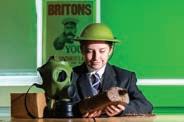
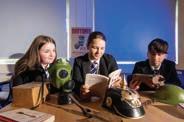

“A different language is a different vision of life.”
– Federico Fellini
Exam Board: EDEXCEL
Why should I study Spanish?
- To improve your employability
- To stand out when applying for university
- To live and work abroad
- To enjoy travel
- To increase your awareness of other cultures and countries
- To speak one of the most widely spoken languages in the world
How is the course assessed?
The language courses are assessed by final examinations at the end of Year 11. The four skills of listening, speaking, reading and writing will be assessed separately.
Examinations are in two tiers:
Foundation Tier Grades 1 - 5
Higher Tier Grades 4 - 9
What can this course offer me?
The course offers in-depth study of the language you have chosen, through various methods, including interactive, individual and group work. It will provide you with the ability to communicate clearly, be confident about speaking in public, use problem- solving strategies and many other skills which are useful in a wide range of future careers. A language adds an international dimension to your academic profile, and this is something many employers look for.
What will this course prepare me for?
The course prepares you for a lifelong journey of learning, and a love of languages. It prepares you for life as part of a “global community”. Now, more than ever, it is vital to study a language.
There is a plethora of career paths available to you as a linguist. Studying another language makes you more employable as you can fulfil the role of two people. Some career pathways to consider are: Translator, Interpreter, Diplomat, Video game localization, Teacher, Lecturer, Analyst, Consultancy, Civil Servant, Engineer, Subtitling, Copywriting, Publishing

“What would life be if we had no courage to attempt anything?”
- Vincent Van Gogh, World famous Artist and Pioneer of artistic movements.
Exam Board: OCR
Why should I study Art & Design: Fine Art?
Studying Art and Design at GCSE is the first step for students to take should they be interested in a career within the creative industries.
Architects, illustrators, teachers, designers (from fashion, graphic, set/stage, product, textile, surface pattern, costume to computer games), media, TV and advertising, Art therapists, makeup artists, hairdressers and any career that requires vision and an artistic flair. The opportunities within this field are endless.
These activities help develop the capacity to generate and communicate ideas and feelings. You can enhance your perceptual skills through recording, responding, developing and evaluating, to create interesting and aesthetically pleasing work.
All students follow the OCR Art and Design – Fine Art Specification.
In GCSE Art and Design, students will study a variety of techniques, materials, and creative processes to develop their artistic skills and personal style. They will explore areas such as drawing, painting, printmaking, sculpture and textiles. Depending on their chosen focus and available resources. Students will also study the work of artists, designers, and art movements from different cultures and historical periods, using this research to inspire and inform their own work. The course emphasizes experimentation, creativity, and idea development, and students will build a portfolio of work based on themes or projects that reflect their personal interests. This culminates in a final exam where they produce a completed piece under timed conditions.
How is the course Assessed?
The GCSE has TWO components.
4 Attainment objectives to hit throughout the course of the GCSE. These will be broken down for students at the beginning of the course.
A portfolio of practical work showing their personal response to a centre, or learner-set starting point, brief, scenario or stimulus. Students will follow a chosen theme (pathway) to create the Portfolio. There will be a range of pathways to choose from such as:
- The Natural world
60% of total GCSE
Externally set task (Non written exam)
40% of total GCSE
- Distortion - Identity
-Urban Life
-Food Glorious Food -Metamorphosis
Students will create their own starting point from these pathways, they will initially be taught different skills and shown how to enhance their artistic tool kit with a workshop setting. Students will experiment with different mediums, create intelligent links with contextual artists and movements to inform their project and create personal responses to their research.
The early release paper will be issued in January of the examination year and will provide learners with five themes, each with a range of written and visual starting points and stimuli.
A visual response should be based on one of these options.
The end ‘exam’ is a 10 hour controlled assessment where students are expected to create a final outcome to component 02.

What can this course offer me?
You will have the opportunity to develop a wide range of skills including experimenting with a wide range of materials to develop your own original ideas. You will learn the importance of time management; balancing coursework deadlines helps develop organisational skills. You will also learn how to analyse and evaluate your own work and the work of others, which sharpens your critical thinking. By building a portfolio of work, you will gain a sense of accomplishment and boost your confidence, preparing you for future career and education.
What will this course prepare me for?
GCSE Art and Design: Fine Art prepares students for a wide range of future opportunities by developing their creativity, problem-solving skills, and ability to communicate visually. It equips students with practical skills in various media, such as drawing, painting, digital design, and sculpture, while fostering critical thinking through the analysis of their own work and that of others. This subject lays the groundwork for further education in creative fields like A-Level Art, college courses, or apprenticeships, and opens doors to careers in industries such as design, fashion, architecture, and media. Beyond specific career preparation, it nurtures transferable skills like time management, teamwork, and self-expression, making it valuable for personal growth and professional versatility.
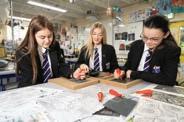
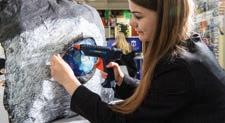

“Everybody should learn to program a computer, because it teaches you how to think.”
- Steve Jobs, former CEO and creator of Apple
Exam Board: OCR
Why should I study Computer Science?
If you enjoy problem-solving, creativity, and technology, Computer Science GCSE can be a valuable and enjoyable subject that sets you up for a bright future. Having a Computer Science GCSE can make your academic profile more attractive to employers and educational institutions. In a rapidly evolving job market, computer science knowledge makes you versatile and adaptable.
Computer Science will encourage you to:
- Understand and apply fundamental principles and concepts of Computer Science including; abstraction, decomposition, logic, algorithms and data representation
- Analyse problems in computational terms through practical experience of solving such problems, including designing, writing and debugging programs
- Think creatively, innovatively, analytically, logically and critically
- Understand the components that make up digital systems, and how they communicate with one another and with other systems
- Understand the impacts of digital technology to the individual and to the wider society
- Apply mathematical skills relevant to Computer Science
What will I study?
- Independently finding solutions to problems by designing algorithms and using programming techniques
- Using a range of techniques to develop understanding of the theory of Computer Science
- Being challenged to problem solve and gain knowledge and skills of great importance in the digital age
How will I be assessed?
You will be assessed by 2 elements:
Computer Systems (Written exam)
(1hour and 30 minutes)
50%
Computer Thinking, algorithms & programming (Written exam)
(1hour and 30 minutes)
50%
Practical Programming Projects
Systems architecture; Memory and storage; Computer networks, connections and protocols; Network security; Systems software; Ethical, legal, cultural and environmental impacts of digital technology
Algorithms; Programming Fundamentals; Producing robust programs; Boolean logic; Programming languages and integrated development environments
In addition to the formal assessment, you will also have an opportunity to undertake programming tasks either to a specification or to solve problems during the course of study.
What will this course prepare me for?
Computer Science A level is a natural progression, but this subject underpins many other STEM subjects like engineering. It is a highly regarded GCSE and is classed as an EBacc subject. DIgital skills are required in so many Careers excitedly including ones that do not even yet exist. Local labour market information shows Computing related jobs as a growth area. The National Cyberforce will be coming to Lancashire by 2030 creating at least 2000 jobs including cybersecurity. In these jobs you may get to work on top secret missions to protect the nation or work with the brightest minds to make the internet safe.

The spread of computers and the Internet will put jobs in two categories. People who tell computers what to do, and people who are told by computers what to do.”
–Marc Andreessen, Entrepreneur, Inventor of Netscape
Exam board: OCR Cambridge Nationals
Why should I study iMedia?
- Huge demand for a skilled and digitally literate workforce
- Digital media products are used in almost every business
- A key part of many areas of our everyday lives
- Vital to the UK economy that the workforce is equipped with creative people
Digital Media is a key part of many areas of our everyday lives and vital to the UK economy. Production of digital media products is a requirement of almost every business so there is huge demand for a skilled and digitally literate workforce. This course will provide you with the skills for further study in subjects such as media, journalism, design or business.
Students will be awarded a grade from a Pass at level 1 through to Distinction* at level 2, students need to complete all three units to be awarded their grade
How is the course assessed?
i-Media in the media industry
What will this course prepare me for?
Some careers using Creative i Media include: Web designer, Animator, Photo editor and Social Media Manager
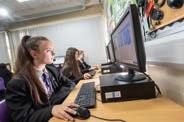
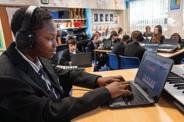

“Everybody should learn to program a computer, because it teaches you how to think.”
- Steve Jobs, former CEO and creator of Apple
Exam Board: OCR Design and Technology
Why should I study Design and Technology?
GCSE Design and Technology (D&T) is an exciting and rewarding subject that combines creativity, practical skills, and problem-solving. It allows you to turn ideas into real products, teaching you how to design, create, and evaluate solutions to real-world challenges. If you enjoy hands-on learning, D&T provides the opportunity to work with tools, materials, and technologies like 3D printing and CAD software, bringing your imagination to life.
Studying D&T equips you with transferable skills highly valued in both education and the workplace. You’ll learn critical thinking, teamwork, and project management—abilities that are essential in careers like engineering, architecture, product design, and fashion. The subject also fosters environmental awareness, encouraging you to consider sustainable materials and ethical design principles.
In year 10
Students would start their 2-year GCSE journey, having 6 hours a fortnight. The curriculum is designed to inspire creativity and innovation, focusing on developing practical skills and theoretical knowledge. The course is divided into two main components and here at Wellfield we aim to tailor the learning to our students and ensure topics are clear and concise to allow the students to make the connection.
Core Principle
- Materials and their properties: woods, metals, polymers, textiles, and composites.
- Manufacturing techniques and processes, including traditional and modern methods such as CAD/CAM.
- Sustainable design: environmental impact, life cycle analysis, and ethical considerations.
- Emerging technologies and their influence on design and production.
Design and Make Principles
- Understanding user needs, market research, and creating design briefs.
Year 11
- Sketching, modelling, and prototyping to develop and test ideas.
- Using tools, equipment, and digital technologies to create high-quality outcomes.
How is this course assessed?
- Non-Examined Assessment (NEA) (50%): A design and make project, where students respond to a context or problem and create a functional product using the iterative design process.
- Written Exam (50%): Testing core and specialist technical principles, as well as application of design principles.
This balanced curriculum enables students to develop essential skills for further education or careers in design, engineering, and technology.
GCSE Design and Technology is not just about making things—it’s about developing versatile skills and exploring how design shapes the world. Whether you choose a creative, technical, or practical field, D&T equips you with the tools to succeed.

D&T provides an excellent foundation for pursuing A-levels, technical qualifications, or apprenticeships in related fields:
- A-Levels: Design and Technology, Product Design, Engineering, Textiles, Graphic Design.
- Vocational Courses: BTECs in Engineering, Construction, or Digital Media.
- Apprenticeships: Opportunities in carpentry, manufacturing, CAD design, or engineering.
Architecture and Interior
Designing building or spaces.
Civil, mechanical, electrical, or software engineering.
Designing garments or sustainable fabrics
Construction
Roles in construction, production, or quality control.
Advertising and Graphic Design
Branding, packing and marketing
Creating consumer goods, electronic, or furniture Technology and Innovation
Careers in robotics, renewable energy, or app development.

“We must all do theatre, to find out who we are, and to discover who we could become.”
- Augusto Boal
Exam Board: EDUQAS
Why should I study Drama?
Drama enhances students’ artistic and creative abilities and gives them a better understanding of themselves and their world. Within Drama, you will not only study the craft of acting and theatre, you will also learn extremely valuable transferable skills for example – collaboration, empathy, analysis, evaluation, deconstruction of a given subject and construction of performance pieces. If you enjoy working creatively and practically in groups, pairs and/or individually, or want to develop your knowledge and understanding of drama as well as your self-confidence as a performer and/or designer then you will enjoy this course. You will need to be able to work independently as well as with others.
What will I study?
During the course students cover a variety of key performance and theatrical skills including:
- Use of voice, body and movement to communicate meaning
- Evaluation of live theatre productions
- Study of scripted work and theatre practitioners
- Collaborative work through devising from a given stimulus
How is the course Assessed?
Unit 1
Devised Practical Performance (40%) Unit 2
Performance from a text (20%)
Unit 3
Written Examination (40%)
Internally assessed and externally moderated. Students will participate in the creation, development and performance of a piece of devised theatre using either the techniques of an influential theatre practitioner or a genre, in response to a stimulus set by the exam board. Students will need to produce a realisation of their piece of devised theatre, supporting evidence and an evaluation of the final performance or design.
Externally assessed by a visiting examiner in April/ May of Year 11. Students will be assessed on their acting in a scene from a published play in small groups of between two and five members.
Written paper, 1 hour 30 minutes. Students will be assessed on their ability to analyse one set text as an actor, designer and director and complete a live theatre review.
What will this course prepare me for?
Drama develops skills for life – working as a team, time-management, self-confidence, problem solving, creativity, decision making, communication and performing to strangers or in unfamiliar situations are all important aspects of this course. Drama is a creative subject and works well with other subjects such as Art, English Literature, Music, Dance, Photography and Psychology.

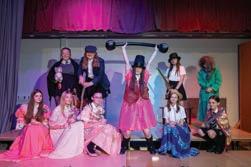

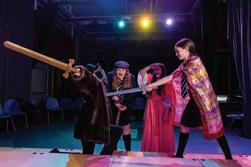
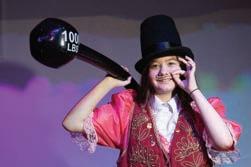

“Your diet is a bank account. Good food choices are good investments.”
- Bethenny Frankel
Exam Board: EDUQAS
Why should I study Food Preparation and Nutrition?
GCSE Food Preparation and Nutrition is an exciting and creative course which focuses on practical cooking skills to ensure students develop a thorough understanding of nutrition, food provenance and the working characteristics of food materials. At its heart, this qualification focuses on nurturing students’ practical cookery skills to dive then a strong understanding of nutrition.
What will I study?
Food Preparation Skills
Food, Nutrition and Health
Students will be required to use general practical skills and knife skills to prepare and produce a wide range of food products. This will include preparing fruit and vegetables, meat, sh and a variety of carbohydrate foods. Students will have to show that they can use all food technology equipment pro ciently while using all cooking methods to prepare, combine and shape food. Students will learn many skills including, sauce making, making and shaping dough with the use of raising agents and how to set mixtures using a variety of di erent ingredients and processes.
In this unit of work, students will learn about macro and micronutrients. They will learn the function in the body, the main sources and the e ects of de ciency or excess. Students will learn about how to make informed choices of food for a varied and balanced diet whilst learning about technological developments associated with better health.
Food Science
Food Safety Food Provenance
Students will research why food is cooked. They will explore di erent cooking methods such as the use of an oven for baking, roasting, braising or the use of a hob for poaching, shallow frying, boiling. This unit of work also examines the functional and chemical properties of food. Food science experiments will feature in this unit of work. This will be to understand the scienti c terms used, such as, gelatinisation, coagulation, and denaturation.
Students will research food spoilage and contamination whilst discussing the positive use of microorganisms in food production. Students will explore how food should be stored and apply their knowledge of food safety when preparing and cooking food.
Students will discuss the factors a ecting food choices related to religion, culture, ethical and medical conditions. They will study traditional British food and International cuisine. In this term students will learn sensory testing methods and how to test the sensory qualities of a wide range of foods. Students must learn the fast-changing laws of food labelling and how it can a ect consumer choice. They will research the meaning of current food labelling in accordance with the Food Standards Agency.
How will I be assessed?
Students will be assessed by completion of 1 written examination and 2 Non-Examination Assessments.
This component is worth 50% of the overall qualification and assesses students’ knowledge and understanding of:
Component 1
Written Examination
Principles of Food Preparation & Nutrition
(1 hour 45 minutes)
Component 2
Non-Exam Assessment 1
Food Investigation
(Task 1 - 15% of the overall qualification)
- Food commodities
- Principles of nutrition
-Diet and good health
-The science of food
-Where food comes from
- Cooking and food preparation
Understanding of the working characteristics, functional and chemical properties of ingredients. Practical investigations are a compulsory element of this Non-Examination Assessment task.

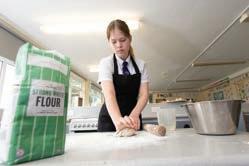
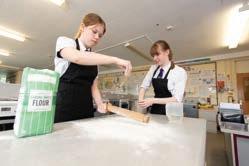
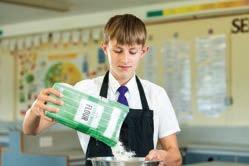


"Chefs don't make mistakes; they make new dishes."
- Elizabeth Brigg
Exam board:
WJEC EDUQAS
Why should I study Hospitality & Catering?
In 2023, the estimated value for the UK hospitality industry is £71.3 billion. This qualification equips students with the knowledge, understanding and skills required to cook and apply the principles of nutrition and healthy eating. It encourages students to cook, enables them to make informed decisions about food and nutrition and allows them to acquire knowledge to be able to feed themselves and others affordably and nutritiously, now and later in life. This qualification will enable learners to gain knowledge, understanding and skills relating to the Hospitality and Catering sector which encompasses all businesses that provide food, beverages, and/or accommodation services (including restaurants, hotels, airlines, tourist attractions, hospitals and sports venues).
Throughout Unit 1, the written examination learners will gain and develop a comprehensive knowledge and understanding of the hospitality and catering industry including provision, health and safety, and food safety. Throughout Unit 2, the controlled assessment, learners will develop and apply their knowledge and understanding of the importance of nutrition and learn how to plan nutritious menus. They will learn the skills needed to prepare, cook and present dishes in response to a brief set by the examination board. They will also learn how to review their work effectively
What skills will I develop?
By studying Level 2 Hospitality and Catering students will:
- Develop an understanding of the different types of establishment and job roles within the catering industry
- Apply their learning to safely prepare, cook and present nutritional dishes
- Understand how catering establishments operate efficiently, legally and financially viable whilst meeting the needs of their potential market.
How is this course assessed?
The WJEC Level 2 Award in Hospitality and Catering is assessed using a combination of internal and external assessment.

“We are all musical instruments, every second of the day our hearts beat out the rhythm we live to” - Mr Quigley
Exam Board: WJEC EDUQAS
Why should I study Music?
Our lives are surrounded by musical sound. It supports us and stimulates our imaginations. The study of music can enrich our experience of life and give us skills to express ourselves with. At key stage 4 students will have opportunities to try out their own musical ideas and styles, as well as develop their overall knowledge of the subject into the foundations for a possible career.
What will I study and how is the course assessed?
Component 1
Performing Music (30% of total qualification)
Component 2
Composing Music (30% of total qualification)
Component 3
Listening and Appraising Music (40% of total qualification)
Controlled Assessment: Internally assessed (by school) and externally moderated (by exam board).
Controlled Assessment: Internally assessed and externally moderated.
Written listening exam: assessed by exam board (external assessment)
Students complete two performances (traditional or technology based), between 4-6 minutes in total. These can be ensemble (group) performances, or a mixture of solo and ensemble. The recordings can be made at any time during the course.
Students compose two compositions of at least three minutes combined: One composition set by the exam board in Year 11 - the student is given guidelines. One ‘free’ composition set by the student.
For this exam, students have four areas of study (AOS) throughout the course:
AOS 1 - Musical Forms and Devices
AOS 2 - Music for Ensemble
AOS 3 - Film Music
AOS 4 - Popular Music
The course is available to all but is best suited to those students who have reached a reasonable level of keyboard, voice or other instrumental skill. An interest in creating their own music and exploring a range of other musical styles is essential.
What can this course offer me?
In addition to helping students acquire subject knowledge, this course: - Providesstudents with the opportunity to gain self-confidence - Develops team-working skills through performing with others - Extends students’ creative and thinking skills through composing music
What will this course prepare me for?
This course will provide you with a solid foundation for progression to music related courses, including A-level music, BTEC music and music technology, as well as a career in music professions in an industry worth 7.6 billion pounds in the UK alone.

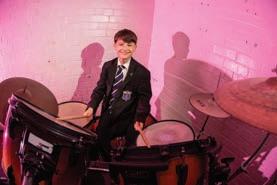
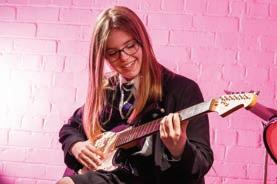
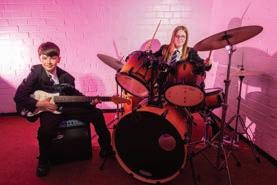

“The camera is an instrument that teaches people how to see without a camera.”
- Dorothea Lange, World famous documentary photographer especially renowned for her WW11 photography.
Exam Board: OCR
Why should I study Art & Design: Photography?
Students should study GCSE Photography because it offers a unique opportunity to explore creativity through the lens of a camera, developing technical skills alongside artistic expression. It allows them to learn how to use cameras, lighting, and editing software while understanding key principles like composition, perspective, and storytelling. Through studying the work of photographers and artists, students gain insight into cultural and historical contexts, inspiring their own creative ideas. Photography also builds transferable skills such as attention to detail, critical thinking, and project management, which are valuable in many fields. Whether as a pathway to creative careers like media, marketing, fashion, or film, or simply as a means to express themselves visually, GCSE Photography equips students with versatile tools for both professional and personal growth.
How is the course Assessed?
The GCSE has TWO components.
There are four Attainment objectives to achieve throughout the course of the GCSE. These will be broken down for students at the beginning of the course.
(60% of total qualification)
A portfolio of practical work showing their personal response to a centre, or learner-set starting point, brief, scenario or stimulus. This could be a physical documentation or an online / digital submission. Students will follow a chosen pathway; they will be given a range of themes to choose from including:
- Identity
-Architecture
- Distortion
- Still life
- Reflection
-Memories
Through this they will learn to understand different photography styles such as: portraiture, studio photography, documentary photography, photojournalism, still life and landscape photography. Mastering the use of digital and analogue photography.
(40% of total qualification)
The early release paper will be issued in January of the examination year and will provide students with five themes, each with a range of written and visual starting points and stimuli. A visual response should be based on one of these options. The end ‘exam’ is a 10 hour controlled assessment where students are expected to create a final outcome to component 02.
What can this course offer me?
GCSE Photography offers students the opportunity to develop creative, technical, and analytical skills while exploring the art of visual storytelling. It teaches them how to use cameras, lighting, and editing software to create impactful images, helping them develop an eye for composition, detail, and perspective. Through studying different photography styles and analysing the work of professional photographers, students gain inspiration and a deeper understanding of artistic and cultural influences.

GCSE Art and Design: Photography prepares students for a wide range of future opportunities by developing their creativity, problem-solving skills, and ability to communicate visually. It equips students with practical skills in various media, such as drawing, painting, digital editing software, and photo manipulation, while fostering critical thinking through the analysis of their own work and that of others. This subject lays the groundwork for further education in creative fields like A-Level Art, college courses, or apprenticeships, and opens doors to careers in industries such as events photographer, fashion photography, social media content creator, graphic designer and Art teacher. Beyond specific career preparation, it nurtures transferable skills like time management, teamwork, and self-expression, making it valuable for personal growth and professional versatility.

"The highest education is that which does not merely give us information but makes our life in harmony with all existence."
– Rabindranath Tagore
Exam Board: WJEC EDUQAS
Why should I study Religious Studies?
Religious Studies develops students into philosophical thinkers who have a passion for exploring the world we live in, its people and their diverse beliefs, customs, cultures and practices. We want to promote respect and tolerance of all belief systems. We aim to create lessons which are exciting, relevant and include current issues.
Religious Studies is one of the richest subjects in the school curriculum - tackling the big philosophical questions in life. As well as developing factual knowledge of moral and religious beliefs, it encourages students to ask questions about life and develops attitudes of confidence and thoughtfulness about themselves - skills which are needed to face common issues in the 21st century!
What will I study and how is the course assessed?
In Years 10 and 11, we follow Specification ‘A’.
The course is assessed through one 2 hour and two 1 hour examinations at the end of Year 11.
There is no coursework for this GCSE course.
This is studied in four sections
1 - Relationships
Year 10
2 - Christian Belief
3 - slam Belief
4 - Issues of Life and Death
This is studied in four sections
1 - Good and Evil
Year 11
2 - Christian Practices
3 - Islam practices
4 - Human Rights
What will this course prepare me for?
In many areas of work, employers are looking for someone with an enquiring mind, an appreciation of other people’s points of view and the ability to make clear informed decisions. In a multi-cultural and diverse society, the ability to understand different cultures is also essential. Religious Studies GCSE looks to develop skills that are relevant to all these attributes and to many different career paths - teaching, social work, law and police work to name a few. As a humanities subject, it is also a useful qualification for college and university and will help gain entry onto several courses.

“Sport is an essential element of education”
- George A. Sheehan
Exam Board: OCR –Cambridge Nationals
Why should I study Sports Studies?
A qualification in Sports Studies will equip students with the knowledge, understanding, skills and values they need to be able to develop and maintain their performance in physical activities. You will gain understanding of contemporary issues in sport and how they impact on different sporting activities. Apply your skills as both a performer in two different sporting activities and as a leader in one sporting activity and understand the relationship between sport and the media and applying this to real life examples.
What skills will I need?
-Resilience -Leadership
- Knowledge of sports - Communication - Teamwork
The course is made up of several components: Compulsory:
Contemporary Issues in sport
R184
R185
(Total marks out of 70)
Performance and Leadership in sports activities
(Total marks out of 80)
By completing this unit you will understand a range of topical and contemporary issues in sport, including learning about participation levels and barriers to completing sporting activities. You will also learn how participation is impacted by the promotion of values and ethical behaviour, about the role of high-profile sporting events, the role of national governing bodies and how technology is used in within sport. The exam length is 1 hour 15 minutes and guided learning hours for this unit is 48hrs.
In this unit you will have an opportunity to develop your skills both as a performer in two different sporting activities, and as a leader, developing a range of transferable skills. You will work both independently and as part of a team, including communicating with team mates as well as being in front of an audience when you perform. You will perform under pressure, both as a participant and as a leader, and will use your initiative to solve problems and make decisions. The guided learning hours for this unit is 48hrs.
Optional- One of the following:
Contemporary Issues in sport
R186
R187
(Total marks out of 70)
Performance and Leadership in sports activities
(Total marks out of 80)
In this unit you will understand the different sides of a range of media sources and apply real life examples to show the nature of the relationship between media and sport. You will also learn how rapid development in technology is enabling sport to be viewed, replayed and discussed whenever and wherever the spectator wants. You will then develop your ability to evaluate and interpret the different ways in which sport is represented by the media. The guided learning hours for this unit is 24hrs.
In this unit you will understand how to find out information about what opportunities there are in your local area as well as nationally in the UK for all different types of outdoor/adventurous activities. You will learn how to enjoy the activities safely by finding out what equipment, clothing, facilities and technology you need, as well as completing planning to help keep you safe. The guided learning hours for this unit is 24hrs.
you?
The Sports sector in the UK is worth over £53.6 billion and has a number of employment opportunities available. Sports studies opens the chance to venture into these avenues, opening many doors to several higher education courses and jobs. There are many careers in sport and some of the main strands are coaching, professional sports person, sports management, teaching, sports psychology, sports journalism and community sport.

Useful Careers Guidance and Future Pathways websites icould.com/watch-career-videos/by-job-type/ www.careerpilot.org.uk/ www.plotr.co.uk/ nationalcareersservice.direct.gov.uk/ www.ucas.co.uk/ www.apprenticeships.org.uk/